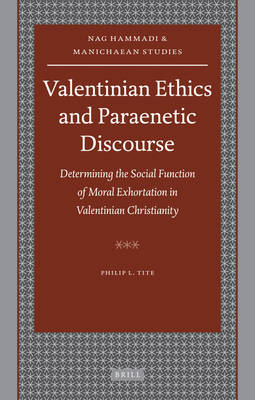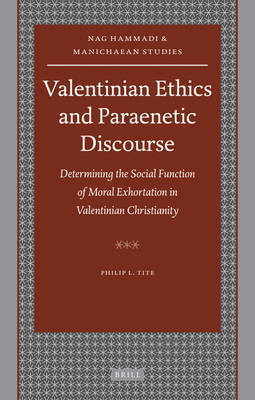
- Afhalen na 1 uur in een winkel met voorraad
- Gratis thuislevering in België vanaf € 30
- Ruim aanbod met 7 miljoen producten
- Afhalen na 1 uur in een winkel met voorraad
- Gratis thuislevering in België vanaf € 30
- Ruim aanbod met 7 miljoen producten
Zoeken
Valentinian Ethics and Paraenetic Discourse
Determining the Social Function of Moral Exhortation in Valentinian Christianity
Philip L Tite
€ 305,45
+ 610 punten
Omschrijving
Offering a fresh assessment of the presence and function of paraenesis within Valentinianism, this book places Valentinian moral exhortation within the context of early Christian moral discourse. Like other early Christians, Valentinians were not only interested in ethics, but used moral exhortation to discursively shape social identity. Building on the increasing recognition of ethical and communal concerns reflected in the Nag Hammadi sources, this book advances the discussion by elucidating the social rhetoric within, especially, the Gospel of Truth and the Interpretation of Knowledge. The social function of paraenesis is to persuade an audience through social re-presentation. The authors of these texts discursively position their readers, and themselves, within engaging moments of narrativity. It is hoped that this study will encourage greater integration of research between those working on the Nag Hammadi material and those studying early Christian paraenetic discourse.
Specificaties
Betrokkenen
- Auteur(s):
- Uitgeverij:
Inhoud
- Aantal bladzijden:
- 368
- Taal:
- Engels
- Reeks:
- Reeksnummer:
- nr. 67
Eigenschappen
- Productcode (EAN):
- 9789004175075
- Verschijningsdatum:
- 31/08/2009
- Uitvoering:
- Hardcover
- Formaat:
- Genaaid
- Afmetingen:
- 168 mm x 246 mm
- Gewicht:
- 771 g

Alleen bij Standaard Boekhandel
+ 610 punten op je klantenkaart van Standaard Boekhandel
Beoordelingen
We publiceren alleen reviews die voldoen aan de voorwaarden voor reviews. Bekijk onze voorwaarden voor reviews.








